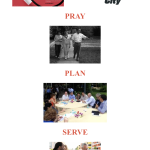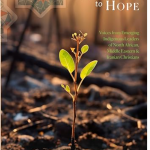I enjoyed this past issue of the International Orality Network (ION) Newsletter. I honed in on J.O. Terry’s article about Learning Leaders. He wrote that they are generally “a peer among the listeners or people group. They may not be literate, or if literate, often are only marginally literate. It is best if learning leaders are taught or trained in the same manner they will in turn use in teaching others.” I thought about Paul’s admonition in II Timothy 2:2 and tried to imagine how we profile students that will become effective replicators of the material, behaviors, and attitudes that we’re modeling.
In fact, speaking of modeling, he added, “Modeling is very important in training. All needed teaching information must be in the lesson. Since a learning leader may be nonliterate, the lesson must be memorable for the learning leader if it must be learned orally. Simple lesson guides rich in participation activities (if culturally appropriate) are helpful. Singing is often a good way to facilitate learning and memory, though this is a cultural preference. Because the learning leader usually does not have knowledge beyond the lesson resource, question and answer activity may not be possible except for a catechism type review. In extreme cases of learning leader nonliteracy a picture illustrating the Bible story may be used to trigger recall and give focus to the lesson.” I admitted to myself that I hadn’t ever thought very deeply about how these type learners would teach others. It would be worth exploring. In that vein, Terry continued, “The learning leader must reinforce listener learning by leader repetition as needed and encouraging listener recitation. The learning leader as a peer will know intuitively how to relate to listeners with proper teaching etiquette that includes how to encourage participation among listeners and how if needed to handle incorrect responses. The use of linked or sequential lessons can reduce learning leader stress without having to introduce unrelated or unlinked new lessons. Periodic reviews by a competent teacher as well as occasional visits to a teaching venue can help to keep the Bible Storying on track and effective.”
In all of this, I realized that storying (and its methodology) was stimulating my thinking about broader discipling processes. All of which makes me wish I could go farther in my training as a storyteller — because I have a hunch that storytelling would teach me more than a bunch of stories. :-) Your thoughts? Are you able to resonate with my conclusions?












Tracking with you 100%. If we’re committed to naming disciples of all peoples, then orality must be on our radar. The only thing I’d add to J. O. ‘s article is that it also relates to literates who have an oral learning preference. At least half and maybe more like 60% of AMERICANS have an oral preference. God wired us for stories! Why not present His truths in a format that is most easily remembered ansmd highly transferable?! Literates must take the initiate–and many of us are!
Thanks for reprinting this article on Learning Leaders. From my years of experience telling the Bible stories and training pastors and evangelists in rural areas, I realized that the Learning Leaders would be the ones to finish the task. I had to model for them what they could do and what best suited their own people. The interesting thing is that I finally humbled myself to learn from them how best to teach. So I owe a debt of gratitude to quite a number of those I trained after they taught me to teach them. I niss those days!
J.O., What an honor that you commented. Thanks for jumping in!
Doug
Coming to grips with the learning preferences of oral communicators over the last 12 years has changed how I teach and write, even to literate people. I find I am more concrete. I am better able to do the quadruple think that is essential for cross-cultural communication of the Scriptures (John R.W. Stott: I Believe In Preaching). In short, teaching storytelling to oral learners has made me a better communicator. Beyond that I have come to believe even more strongly in the strategic importance of teaching leaders in ways they can teach others. We test for this by requiring every storyteller to train an apprentice who can tell all of the Bible stories. We verify this during the final exam by testing the apprentices.